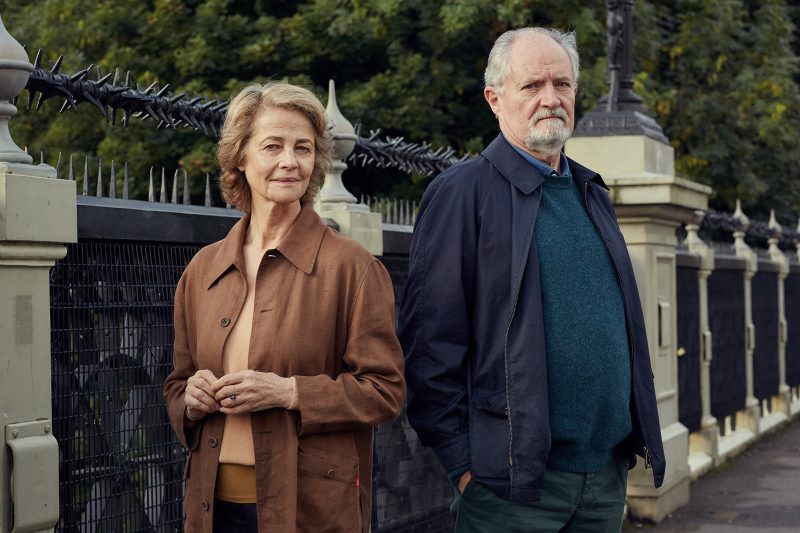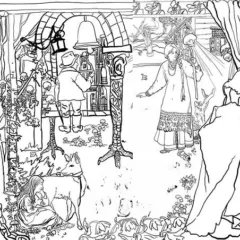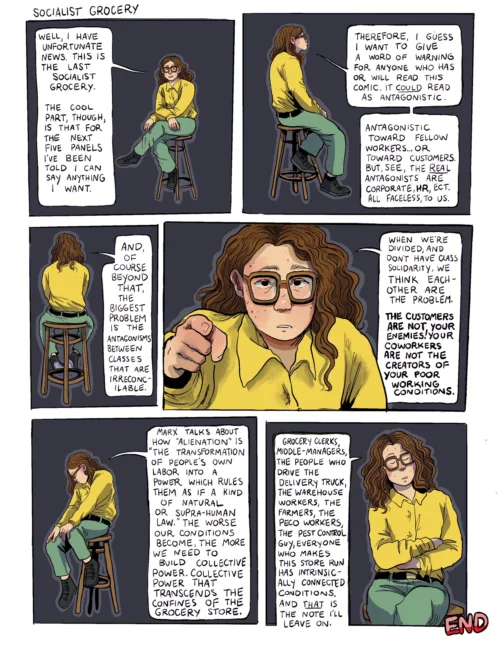
Released in theaters this past March and recently made available to stream online, The Sense of an Ending is the film adaptation of a slender but powerful novel written by Julian Barnes. The protagonist narrator is the middle-aged Tony Webster, divorced father of one daughter who lives a peaceful, if rather unremarkable life. The serene surface of his memories becomes irrevocably disturbed when he receives notice that he has been left the diary of a childhood friend named Adrian Finn who committed suicide decades ago. Tony’s efforts to acquire the diary lead him to reconnect with Veronica Ford, an enigmatic former girlfriend of his (probably his first love) who went on to date Adrian and was dating Adrian when he died.
The plot gains an air of mystery—of trying to discover what is inside Adrian’s diary that can explain why he took his own life, and what role Tony may have had in the sequence of events.
Tony receives clues, including an excerpt of Adrian’s diary and a vicious letter that he apparently wrote to Adrian and Veronica and completely put out of his memory. The content of the letter is unassailable written proof that illustrates Tony’s capacity for malice and hatred in a way that his unassuming narration would never have let on. The reappearance of this forgotten letter is a key point in both the novel and the film, in showing the selectiveness of memory, or the suppression of memory as a form a self-protection.
Barnes’s 2011 novel shares major themes with the 1989 masterpiece The Remains of the Day by Kazuo Ishiguro. In both of these Booker Prize winning novels, an elderly male protagonist in his twilight years turns back to review what appears to have been a life spent in submission to larger forces, going along with the current. Their perceptions of an initially uncomplicated personal legacy become increasingly pained as they scrutinize scenes from the past, points where they made pivotal choices.
A muted translation to film
What did I know of life, I who had lived so carefully? Who had neither won nor lost, but just let life happen to him? Who had the usual ambitions and settled all too quickly for them not being realized? Who avoided being hurt and called it a capacity for survival? Who paid his bills, stayed on good terms with everyone as far as possible, for whom ecstasy and despair soon became just words once read in novels? One whose self-rebukes never really inflicted pain? [Barnes]
Whereas The Remains of the Day had a stellar film adaptation in which Anthony Hopkins and Emma Thompson convey the melancholic spirit of an elderly man and woman who come to realize all that they comprised on and lost, the film adaptation of The Sense of an Ending has significantly dulled the sharp edge of such an emotionally potent novel. From its first page, Barnes’s compact 163 page novel propels readers into a world of Tony’s youthful past, with sparse, intelligent strokes that sketch out the atmosphere while leaving a great deal to the imagination. Easily comparable to the work of Henry James, the master of nuanced social observation who captured the subtle devastations in ordinary exchanges, each page has keen prose to be relished.
Charlotte Rampling shines

In the film, Jim Broadbent plays the present day Tony Webster as a curmudgeon-next-door, who provides curt responses to small talk and shuts the door on the delivery guy too quickly. There is an inherent affability about Broadbent that makes it impossible to dislike Tony. There should be room for ambivalence about Tony, some room to lose sympathy for him if not despise him for his passivity and obliviousness to the pain of others, but the film presents us only one choice: to root for him.
The strongest performance is Charlotte Rampling as the still-inscrutable Veronica in her later years. Her cool, lucid gaze conjures nostalgia for the formative scenes of youth and first love (as seen in flashbacks, in which younger versions of Tony and Veronica are played by Billy Howle and Freya Mavor), while simultaneously underscoring the distance and mystery that now separates those scenes from the present day.
So much of the finer points of relationships in Tony’s past and present are simply absent from the film. Instead, creative liberty is taken to create a substantial plot involving Tony’s adult daughter, played by Michelle Dockery, as a single parent getting ready to give birth to her first child. Creative liberties are surely necessary in attempting to adapt a novel in which so much of the action is psychological rather than physical. Suspense and unease build in the second half of the novel, compelling a reader to the end like a forceful tide that pushes you not to shore but pulls you deeper into vast waters. The movie chooses the low road, offering a saccharine, redemptive conclusion that possesses little subtlety and abandons the essence of Barnes’ brilliant novel.
The Sense of an Ending, (2017) Directed by Ritesh Batra, based on the novel by Julian Barnes is available online at YouTube, Amazon, iTunes and elsewhere.








